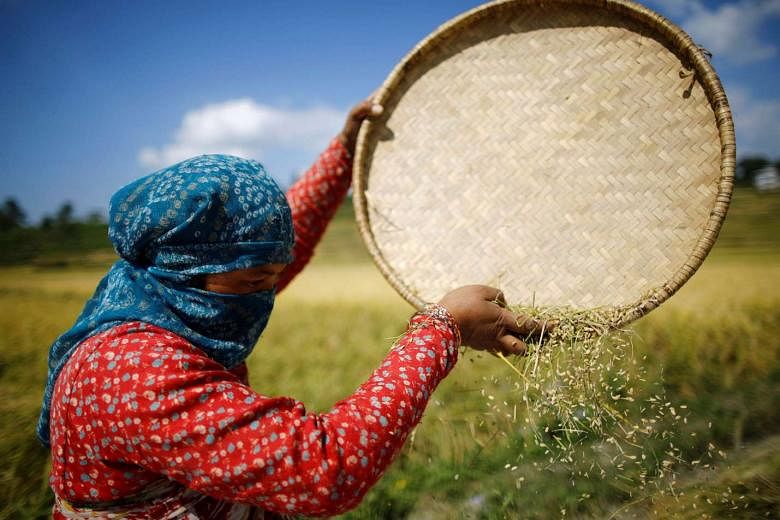Angry rice farmers in the Cambodian city of Battambang blocked a major road two months ago after seeing prices fall 25 per cent since their harvest began. They were protesting over the slow pace of government support. Just over a week later, Cambodia's government responded with an aid package of price support and new loans.
The struggles of Cambodia's farmers are indicative of a regional problem. Asean's smallholder farmers - 20 per cent of its entire population - face several challenges ranging from difficulties in accessing market information to an inability to buy high-quality inputs. They have not been given the priority they deserve within agricultural systems.
While steps have been taken to bring these farmers out of subsistence agriculture, new ideas are needed to ensure they remain valued members of society.
Cambodia is a fascinating window into these issues. The country's agricultural development has lifted four million people - one-third of its population - out of poverty. Cambodian rice, the country's staple crop, has won the World Rice Conference's "World's Best Rice" award three years running.
But Cambodia still has a long way to go. Vietnamese and Thai rice is much cheaper to produce, making it difficult for farmers to compete in regional and global markets. The European Union is reconsidering its preferential treatment of Cambodia's rice (as it no longer qualifies as a low-income country). The country only exported 500,000 tonnes of milled rice out of a three million tonne surplus last year, significantly less than its target of one million tonnes.
Cambodia has an infrastructure problem. Road and railway links are underdeveloped, as are export facilities; the country's best and most convenient port is not its own well-known one in Sihanoukville, but in Vietnam's Ho Chi Minh City.
But "infrastructure" is more than just bridges, trains and ports. Rudimentary farming techniques and little diversification lead to unhealthy soil, smaller yields and low-quality produce. Individual farmers also do not have enough resources to make the necessary investments to improve yields or quality. Many farmers have decided to abandon their fields altogether.
It is not just farmers who are upset. Millers cannot get enough credit to buy rice for processing, even at deflated prices. A lack of adequate drying and storage facilities means a large portion of rice is sold to foreign traders at below-market prices and smuggled out of the country to Vietnam and Thailand, rather than being processed in-country and exported. Finally, it is difficult to get information on best practices out to a diffuse sector of independent, individual farmers.
Some agricultural sectors overcome these structural problems through scale - specifically, by developing large agricultural producers and suppliers. But this displaces smallholder farmers from their property and means of livelihood.
Contrary to the conventional wisdom about development, not everyone can move to the cities and find work. What South-east Asia needs is a model that achieves the benefits of scale without dispossessing farmers of their land, or at the very least gives them a choice in the matter.
BENEFITS OF SCALE
One possible answer is contract farming, where farmers commit to selling a share of their produce to agricultural contractors in exchange for access to high-quality inputs, capital and expertise.
In principle, consolidating land under a "small farmer, big field" approach, where farmers retain ownership of their land while still pooling resources and applying "climate-smart" land preparation, planting and harvesting practices. This could help to achieve some of the benefits of scale without dispossessing farmers of their land. But any such system must be designed with the interests of smallholder farmers in mind.
Contract farming has received a number of deserved criticisms. Farmers can find themselves in a cycle of debt, borrowing money to pay for agricultural inputs, sending most of their revenues back to the contractor. Farmers are also often restricted to grow what the contractor wants, making them vulnerable to market volatility.
But a model of "farmer-centric" contract farming could mitigate these issues, while still facilitating the benefits of scale.
A simple, yet highly effective, measure to support the sustainable productivity of land is to make crop rotation mandatory. Rice, for example, could be alternated with legumes, which restore nitrogen in the soil. The provision of ancillary services such as crop insurance or education, directly or indirectly via the contractor, would also benefit the farmers.
If contractors are truly committed to improving farmers' livelihoods through knowledge transfer, then there is no reason farmer groups could not, over time, launch their own smaller contract family businesses under a franchise-type arrangement, thus bringing the benefits of this model to other smallholder communities.
Suppliers, millers and distributors also stand to gain from a contract model. Ensuring a supply of high-quality produce is a clear benefit, particularly in Cambodia, which now has excess capacity in modern milling.
A contract farming model also helps organise individual smallholder farmers under a single collective organisation, which makes it easier to distribute not just inputs but also important expertise on resource management and quality assurance.
Asean has achieved notable success in reducing rural poverty and promoting agricultural development. But moving things further will require new ideas - and new business models. An enlightened approach to contract farming, and developing mutually beneficial relationships between smallholder farmers and agribusinesses, would be an excellent first step.
- Eric Stryson is managing director of Hong Kong-based think-tank the Global Institute For Tomorrow, and Nicholas Gordon is a researcher there.
- S.E.A. View is a weekly column on South-east Asian affairs.

